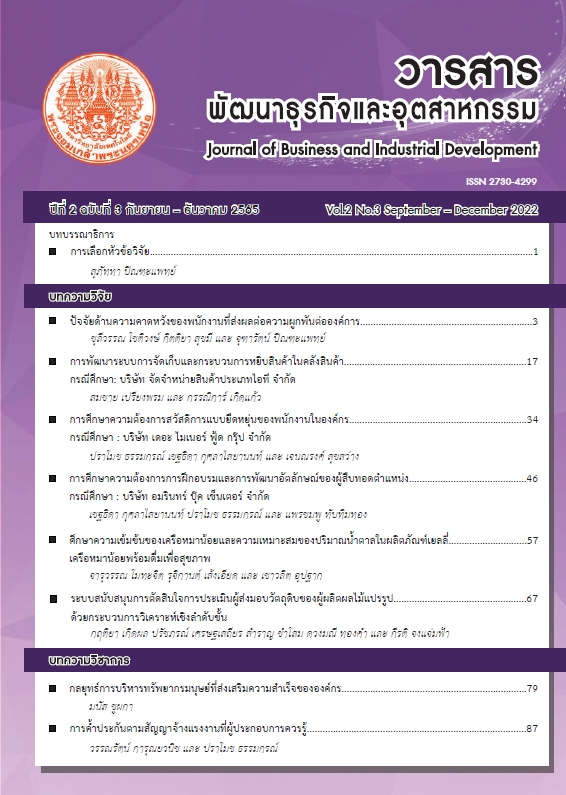Employee Preferences for Flexible Health Welfare Schemes: A Case Study of the Minor Food Group Public Company Limited
Keywords:
Needs, Flexible benefits, EmployeesAbstract
The objectives of this study were 1) to study personal factors and preferences on flexible health welfare schemes as perceived by employees at the Minor Food Group Public Company Limited; and 2) to find out role of different personal factors and employees’ preferences on the explored schemes. The study sample consisted of 187 employees working in the case study company. A questionnaire was used for data collection and the statistics to perform data analysis were percentage, frequency, mean, and standard deviation. The results of the study found that 1) the majority of respondents were below 25 year-old single women working in the marketing department. Employees’ overall needs for flexible health welfare plans was at a high level in this prioritized order: annual medical check-ups, vaccines and immunization, reimbursement of medical expenses for family welfare, and an additional dental coverage; 2) Personal factors, i.e. different individual status affects employee needs and preferences on flexible health welfare plans (*p < .05). Married staff members, both childless and those with parental status demonstrated greater needs for workplace benefits of flexible health welfare than the single counterparts.
References
พิชญ์พจี สายเชื้อ. (ม.ป.ป). Flexible Benefit เทรนด์ในดวงใจพนักงาน Gen Y. Prachachat. http://www.prachachat.net/ news_ sid=1429779177.
ธานินทร์ ศิลป์จารุ. (2557). การศึกษาและการวิเคราะห์ข้อมูลทางสถิติ ด้วย SPSS. กรุงเทพ: วีอินเตอร์พริ้นทร์ กรุงเทพมหานคร.
วัลลภัช สุขสวัสดิ์. (2560). การวิจัยเชิงปริมาณทางรัฐศาสตร์ (พิมพ์ครั้งที่ 1). พิษณุโลก สำนักพิมพ์มหาวิทยาลัยนเรศวร.
กัลยาณี คูณมี. (2554). การบริหารค่าตอบแทนเชิงกลยุทธ์. กรุงเทพ: สำนักงานกิจการโรงพิมพ์องค์การสงเคราะห์ทหารผ่านศึก
มนทกานติ มุญจนานนท์. (2559). การศึกษาผลของความพึงพอใจที่มีต่อการจัดสวัสดิการแบบยืดหยุ่นของพนักงานในบริษัทข้ามชาติธุรกิจนาเข้าและจำหน่ายเครื่องมือแพทย์. วิทยาลัยการจัดการ. มหาวิทยาลัยมหิดล.
ปราณี ศรีสิริประเสริฐ. (2559). การศึกษาสวัสดิการและสวัสดิการยืดหยุ่นของพนักงานสายสนับสนุน. วิทยาลัยการจัดการ. มหาวิทยาลัยมหิดล.
Downloads
Published
How to Cite
Issue
Section
License

This work is licensed under a Creative Commons Attribution-NonCommercial-NoDerivatives 4.0 International License.





